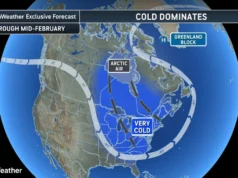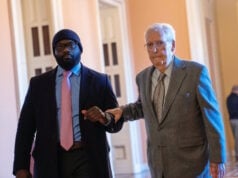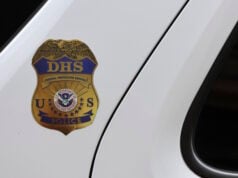
Florida is among the states that have ramped up voter ID laws since former President Donald Trump made false claims of a rigged 2020 election. November will see the first elections run under those new laws.
According to VoteRiders, a voting advocacy organization, voter ID requirements have stiffened in 18 states since 2020 and 38 states have voter ID laws in place for the 2024 election.
“I think we can draw a direct line between lies about election integrity in 2020 and the passage of voter suppression laws, including new and stricter ID laws across the country,” said Lauren Kunis, executive director of VoteRiders, in an interview with the Phoenix.

Following his loss in the 2020 election, when Trump made false claims that victory had been stolen from him using falsified ballots, legislatures reacted by making it harder to vote.
“There were a lot of lies and misleading narratives about mail-in voting being fraudulent. I hate even giving oxygen to that, but that’s what was being put out there,” Kunis said. “And a response that we saw in statehouses was to add unnecessary, complicated, confusing, and costly ID requirements to mail in voting.”
In 2021, SB 90 went into effect in Florida, creating regulations surrounding vote-by-mail ballots including limiting the use of ballot drop boxes and requiring the last four digits of a voter’s social security number or Florida ID number to vote by mail.
SB 7050, which passed in 2023, increased restrictions on third-party voter registration organizations, although a federal judge blocked parts of it in May, including a provision prohibiting noncitizens from assisting in registering citizens — which Taylor Ashley Crowe, Florida coordinator for VoteRiders, called a “victory for democracy.”

“This was a clear attack on the spirit of civic engagement and volunteerism, with many of these volunteers being legal permanent residents, and they contribute significantly to our communities,” Crowe said. “Their involvement in voter registration drives is an essential part of our democratic process.”
Third-party voter registration organizations often collect voter registration applications and facilitate the process. However, some halted operations following passage of SB 7050, which steeply boosted fines for committing errors during the registration process.
Earlier this summer, the U.S. House passed the SAVE Act, which would require people to provide “documentary proof of U.S. citizenship to register to vote in federal elections,” according to the bill summary.
The act is not expected to pass the U.S. Senate, but the proposal and other conversations around the topic could shape the ways statehouses address the matter, according to Kunis.
“That is a worrying trend that we at VoteRiders are carefully monitoring, because we think no matter what happens in November it’s likely that statehouses when they come back into session in 2025 begin to impose additional hurdles to voter registration that would affect tens of millions of voters,” Kunis said.
Among the post-2020 restrictions in some states are elimination of use of student IDs or discontinuing acceptance of expired IDs. The VoteRiders website lists these restrictions.
Laws increasing barriers to the franchise can spark counter-effects, too, according to Kunis. For one, groups like hers have been prompted to “raise a lot of resources and get active on the ground and work very hard to fight back,” she said.
A survey conducted in late 2023 by VoteRiders, Public Wise, the University of Maryland, and the Brennan Center for Justice found a majority of people do not know whether their state requires a photo ID to vote.
The survey reports that 55% of people in states with photo ID requirements do not understand that photo ID is required and 65% of people in states where no photo ID is required do not know it is not required.
According to the survey, nearly 9% of voting-age Americans lack up-to-date drivers’ licenses — about 20.76 million people — and just over 1% of Americans lack a government-issued photo ID.
Voters in Florida must provide a photo ID when casting ballots in person and provide a drivers’ license number or the last four digits of a Social Security number when requesting a vote-by-mail ballot.
“That becomes a hurdle when someone doesn’t have access to their ID to have that number,” Crowe said.
Florida is rated as a “non-strict” voter ID state, falling between “strict” states and states with no voter ID requirements.
If a photo ID has a signature on it, it can stand alone in Florida. If not, a voter must bring an ID that does bear a signature — the second ID does not need a photo.
Democrats (9%) reported not having a drivers license at a higher rate than Republicans (6%), although for nonparty-affiliated and other voters the figure was 18%, according to the survey.
An up-to-date ID includes a current address, which can be a problem for college students or other people who have recently moved. Voter ID laws are also more likely to disenfranchise communities of color, new voters, low-income individuals, and people who’ve changed their names following a marriage or transition, according to Kunis.
The survey reports that 47% of Black Americans aged 18-29 lack a driver’s license with their current name and/or address. Thirty percent lack any license at all, compared to the same age range for white Americans, 5% of whom lack a license.
Eligible voters can self-disenfranchise if they are confused or misinformed about voter ID requirements, Kunis said.
“I think a lot of new voters or newly naturalized citizens in environments in states like Florida and a growing number of other states around the country might feel understandably intimidated to cast a ballot. They feel like they are not welcome, and they might be unsure about our ID requirements and think what they have isn’t sufficient, so they stay home,” Kunis said.
Despite the disadvantage to college students, Kunis said, there’s an upward trend nationally toward young people voting.
“I think we’ve seen a lot of encouraging progress at the national level when it comes to putting polling stations on campus or doing sort of organized events to activate the newest generation of voters in our democracy,” Kunis said.
Registration and ballots cast among young people are higher than they have been in decades.
“But I think there’s still a lot of progress to be made, and I would love to see more and more educational institutions stepping up and playing an active role in empowering the next generation of voters,” Kunis said.
Party-by-party
This week, the number of Florida registered Republicans surpassed registered Democrats by 1 million voters. The shift zooms the GOP past the 97,000 lead Democrats held in 2020.
In a news conference this week, Florida Democratic party Chair Nikki Fried responded to that news by arguing a legislatively mandated removal from the state’s active-voter list of infrequent voters, including many Democrats, has affected the count (although these voters remain eligible to cast ballots).
“We’ve got a lot of new tools inside the party. Is it going to happen overnight? Of course not. We don’t have the luxury of changing the law like that, like the Republicans do, to wipe out our voter registration base, but certainly we are fighting back,” Fried said.
House Speaker Paul Renner attributed the growth in registered Republicans to policy.
“The reasons are clear: We prioritize public safety; balance our budget; promote political, economic, and educational freedom (ranking No.1 on education and the economy); and make major investments to improve our environment and infrastructure,” Renner posted to X.
Disclaimer
The information contained in South Florida Reporter is for general information purposes only.
The South Florida Reporter assumes no responsibility for errors or omissions in the contents of the Service.
In no event shall the South Florida Reporter be liable for any special, direct, indirect, consequential, or incidental damages or any damages whatsoever, whether in an action of contract, negligence or other tort, arising out of or in connection with the use of the Service or the contents of the Service.
The Company reserves the right to make additions, deletions, or modifications to the contents of the Service at any time without prior notice.
The Company does not warrant that the Service is free of viruses or other harmful components












